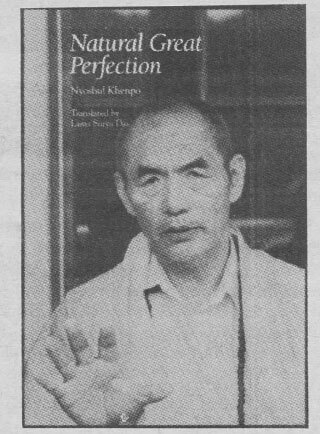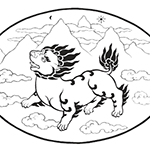| The following article is from the Autumn, 1995 issue of the Snow Lion Newsletter and is for historical reference only. You can see this in context of the original newsletter here. |
by Nyoshul Khenpo Rinpoche trans. & ed. by Lama Surya Das
150 pp. #NAGRPE $14.95

The following excerpt from Natural Great Perfection was taken from the chapter entitled You Are Dzogpa Chenpo.
People commonly find themselves in difficult relationships. As long as we are stili subject to karma and kleshaconflicting emotionsthere will inevitably be countless ups and downs. Yet, if people are committed to helping each other, to serving each other, to growing and awakening to gether, then ali circumstances and situations are perfectly workable, whatever roller-coaster-like dips and turns unexpectedly come along. This is an example of practicing bodhicitta by actually applying it in our daily life, which is actually the principal point.
When we practice bodhicitta prayers or meditations, it may look like we are alone, like we are practicing for ourselves, but we are not practicing for ourselves, and we are not alone. Ali beings are inter-connected, and in that sense they are present or affected. Milarepa sang, When I am alone, meditating in the mountains, ali the Buddhas past, present, and future aie with me. Guru Marpa is always with me. Ali beings are here.
We are not practicing for ourselves alone, since everybody is involved and included in the great scope of our prayers and meditations on this perfectly pure motivation. The naturai out-flow of so-called solitaiy meditation or prayer is spontaneous benefit for others; it's like the rays ofthe sun, rays which spontaneously reach out. This good heart, pure heart, vast and open mind, is called in Tibetan sem karpo, white mind. It means pure, vast, and open heart. This is innate bodhicitta. It is not something foreign to us, as we well know, yet it is something we could relate to more, cultivate, generate, and embody. We talk about vast and profound teachings of Dharma, such as Dzogchen, but without this goodness of heart, this un-selfishness, it is mere charter, gossip, and rationalization.
If a man is looking for a companion, sometimes he is only thinking that he wants a woman to make him happy for his own reasons. Not often is he thinking how he can benefit or help his companion. Such a relationship is already built on the tip of a very limited motivation or intention, and the results of that are questionable. Many people stay in a hotel; the hotel is very interested in making the guests happy, but in general their sole motivation is business. The reason to make the guests happy is for their own profit. What ultimate benefit can there be in trying to make people happy in such a limited way, simply for one's own profit?
If one practices the incredibly rare and profound teaching of Dzogchen, nondual Dzogchen, with an intention like this: I want Dzogchen, I want enlightenment. I'm going to get it in this life, and there is a great deal of grasping, pushy, small-minded selfishness, how can there be any Dzogchen? This is the very antithesis of the vast, unconditional openness of Dzogchen. This is how we stray from the true path and become wild practitioners and even become crazy. If self-clinging, self-cherishing, and clinging to the re-ality of things remains strong, how can there be any genuine Dzogchen, which is the true naturai state of freedom, openness, and primordial perfection?
If you practice bodhicitta practicesmind training, loving-kindness prayers, exchanging oneself and others (tong len) and so forth-these practices may seem conceptual and relative, but they actually include the absolute truth that is the very nature of Dzogchen: vast openness, big mind, purity, freedom, andnon-grasping. Unselfishness is no different than that nondual openness, vast emptiness, shunyata. Dzogchen may be as primordiali pure and ever unaffected as the virgin snow, but approaching it with mixed motivation or impure selfish aspiration is a great limitation. When you urinate in the snow, the snow starts white, but suddenly it's yellow.
The word for bodhicitta in Tibetan is sem kye. This literally means the opening or blossoming of the mind. It is the opposite of small mind, of selfpreoccupation, self-contraction, and narrowness. Whatever practice-path we find ourselves on-be it Dzogchen, Vajrayana, the Bodhisattvayana, the fundamental Theravadin Vehicle, or another spiritual path-if we have a pure, wholesome attitude and a spacious and tolerant mind, then our practice is really Buddhist practice; it is in line with practice that really blossoms and unties the mind. This is the real meaning of bodhicitta.
It may be that the sky is always limpid, clear, vast, infinite, and so on, but when the moment of Dzogchen arrives it is as if the sun has suddenly risen. It is not that the sky of our inherent nature has improved, but something definitely does seem to happen. This metaphor of the rising sun refers to the rangjung yeshe, the spontaneous, self-born awareness wisdom or innate wakefulness dawning within our nature. This is the moment of Dzogchen, the dawn of the self-arisen awareness wisdom, innate wisdom.
This is the meaning of what is called in Tibetan nyur de dzogpa chenpo, meaning swift and comfy innate Great Perfection-a path that does not require austerities or arduous practices. It is direct, swift, spacious, natural, and comfy. It is doable
In one lifetime, in one body, even in one instant of self-arisen awareness, this dawn of Vajrasattva-the self-born innate awareness wisdomshines forth like a blazing inner sun. When you relate to this self-arisen innate awareness wisdom, when you practice Dzogchen as it actually is, this fleeting human existence is instantaneously made meaningful. And not just this life, but ali our lives are made meaningful, as well as the lives of ali those who have been connected with us. This experience of the naturai state of the luminous innate Great Perfection implies the annihilation, the crashing into dust, of ali forms of self-clinging and duality, of clinging to the concrete reality of things, to their appearances.
The inherent freedom of being is spontaneously, primordially present. Ali delusory perceptions are naturally nonexistent in this dawn of innate awareness wisdom. The proliferation of karma and klesha is based on dualistic clinging, ignorance: in the light of nondual awareness, the kleshas do not obtain. Eveiything falls apart because it is inherently unborn from the beginning; and the freedom of perfect being, of rigpa, spontaneously present since the beginningless beginning, is clearly and thoroughly realized in that very moment. ?

